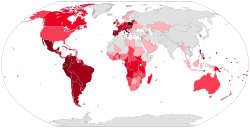| Part of a series on the |
| Catholic Church by country |
|---|
 |
| |
The Mission Sui Iuris of Funafuti (Latin: Missio Sui Iuris Funafutinum) is a Catholic Latin mission sui juris (pre-diocesan missionary jurisdiction) in Tuvalu, Polynesia.
Contents
It depends on the Congregation for the Evangelization of Peoples, yet it is exceptionally not exempt, but instead is a suffragan of a Metropolitan archdiocese. Since 21 March 2003, that metropolitan see has been the Archdiocese of Suva; until that date, it had been a different see, i.e., the Archdiocese of Samoa-Apia.
Its only place of worship is Teone Church in Vaiaku, on Fongafale island in Tuvalu.
On June 3, 2024, Pope Francis appointed Mission Society of the Philippines priest, Fr. Eliseo Napiere, as superior of the Mission sui iuris of Funafuti. He succeeded Reynaldo B. Getalado, M. S. P., appointed in 2014, who was installed Coadjutor bishop of the Roman Catholic Diocese of Rarotonga on April 27. [1]